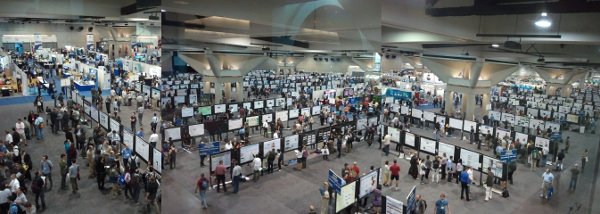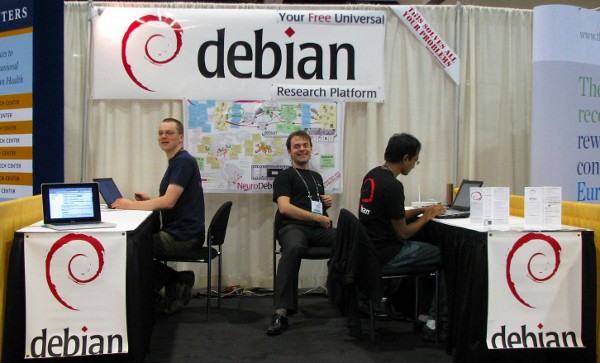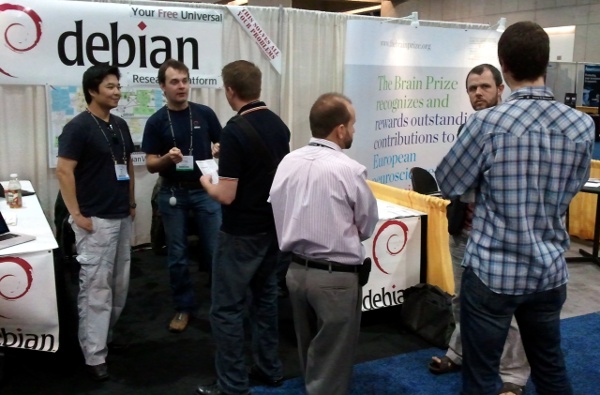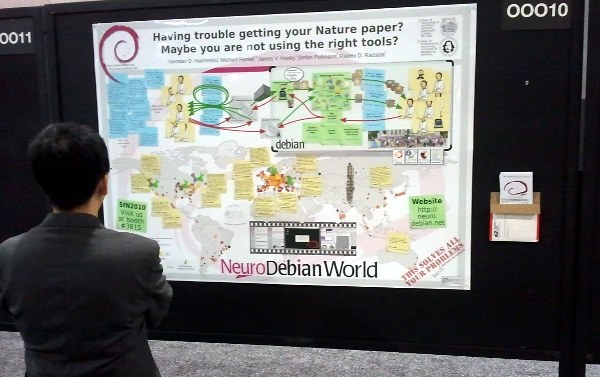
During November 13-17, 2010 the NeuroDebian team ran its first Debian booth at the annual meeting of the Society for Neuroscience (SfN2010) in San Diego, USA. We presented the upcoming release Debian 6.0 Squeeze and demonstrated its utility as a robust and versatile research environment for neuroscience. Booth visitors had the opportunity to meet with developers of neuroscience research software, and to get information on available software and recommendations for deployment strategies in research laboratories.

The annual meeting of the Society for Neuroscience is one of the largest neuroscience conferences in the world, with over 30,000 attendees. Researchers, clinicians, and leading experts discuss the latest findings about the brain, nervous system, and related disorders.
Don Armstrong kindly provided us with Debian banners to decorate the booth and some Debian T-shirts to give away. Moreover, we were equipped with laptops running Debian squeeze and sid, as well as two additional laptops each running a Debian squeeze virtual machine on top of Mac OS X and Windows, respectively (CDs with the VM image were also available for visitors to take home). To demonstrate Debian’s versatility, we had a complete Debian archive mirror that was used to show the full selection of available software and the simplicity of installation and upgrade procedures. The mirror was provided from an external harddrive by a commodity router box running the Debian-based DebWrt distribution. All machines were connected to our own local wired network to avoid problems with conference center’s free wireless network (poor at best). Finally, we had several hundred tri-fold flyers with general Debian facts on one side, and NeuroDebian facts on the other (sources are available).

Final booth setup with staff (left to right): Michael Hanke, Yaroslav Halchenko and Swaroop Guntupali.
The booth was well attended on all days of the conference. Many people were somewhat surprised, but also pleased to see Debian represented. The visitors comprised the whole range from long-term Debian users to people who were not aware of an operating system other than Windows and Mac OS.
A number of visitors were involved in free software development – at various levels. We talked to a Debian ftpmaster, a Gentoo developer, various developers of neuroscience-related software that is already integrated in Debian and many more whose work still needs to be packaged. We were visited by representatives of companies looking for support to get their open-source products into Debian. The vast majority, however, were scientists looking for a better research platform for their labs. That included the struggling Phd-student, as well as lab heads sharing their experience managing a computing infrastructure for neuroscience research.
The Debian booth also served as a platform for upstream developers to meet with Debian users of their software.

The overwhelming majority of visitors running some Linux flavor used a Debian-based operating system – including Debian itself, Ubuntu and sidux/apttosid. Especially people using Python for research purposes seem to prefer the comprehensive support of Python modules in Debian, whereas e.g. R users are more uniformly distributed across GNU/Linux distributions. This assessment is, of course, biased by the fact that Debian was the only distribution that was present at this conference.
In general, we had the impression that Linux users employ a larger variety of tools in their research activities, whereas users of proprietary operating systems tended to limit themselves to a more restricted set, or use an intermediate computing platform, such as Matlab.

During the conference’s poster session we explained the Debian system and community processes to many interested visitors (download the poster).
While there was a large variety of topics that were brought up by visitors there were some common patterns.
Visibility
For a Debian developer it may be surprising, but many people still do not know that Debian exists – even despite the fact that Debian is often a perfect match for their particular requirements. People who got introduced to Debian at the booth often couldn’t believe what they were hearing or seeing: so much software, runs on any hardware, all for free.
We believe it would be very beneficial for Debian to reach out beyond the IT sector and present itself in all fields of applications that it already supports today.
Debian and Ubuntu
Apparently it is still a largely unknown fact that Ubuntu is based on Debian.
Live-CD
There was a significant demand for (customized) Live-CDs. On one hand, people were asking for a way to quickly try out Debian (and we believe that this doesn’t necessarily have to be a live-cd). On the other hand, for example, teachers were asking for means to temporarily deploy Debian on, e.g. university computer pool machines and use Debian-packaged software for teaching courses (e.g. on brain-imaging data analysis).
Electrophysiology tools
Of all subfields of neuroscience, electrophysiology researchers expressed the greatest demand for better tools in Debian – or basically at least some specialized tools at all. Moreover, many research projects relying on FOSS solutions in electrophysiology already use Debian-based systems to accomplish the mission; they just rely on manual (from sources) deployment of the necessary tools. We started a new Debian Science Blend task to collect information about existing relevant software and to eventually package it.
Realtime capabilities
Apparently, numerous research groups utilize Debian-based equipment to perform various flavors of real-time data acquisition and processing. They expressed their demand for real-time capabilities of (some) Debian kernel images.
Cloud-computing
Cloud-computing seems to be an increasingly interesting topic for neuroscience data analysis. We got the impression that there is a tendency to look for alternatives to Matlab to be able to run analyses in the cloud cheaper (or at all). We pointed people to ongoing efforts in Debian to enable Debian-based cloud computing (see e.g. the Debian wiki).
Throughout the conference many people stopped by to express their gratitude to Debian for developing their operating system of choice. We want to affirm this and relay it to the larger Debian community. Thanks for Debian.
This booth has been made possible by the generous support of Prof. James V. Haxby (Dartmouth College, New Hampshire, USA) and other donations to the Debian project.